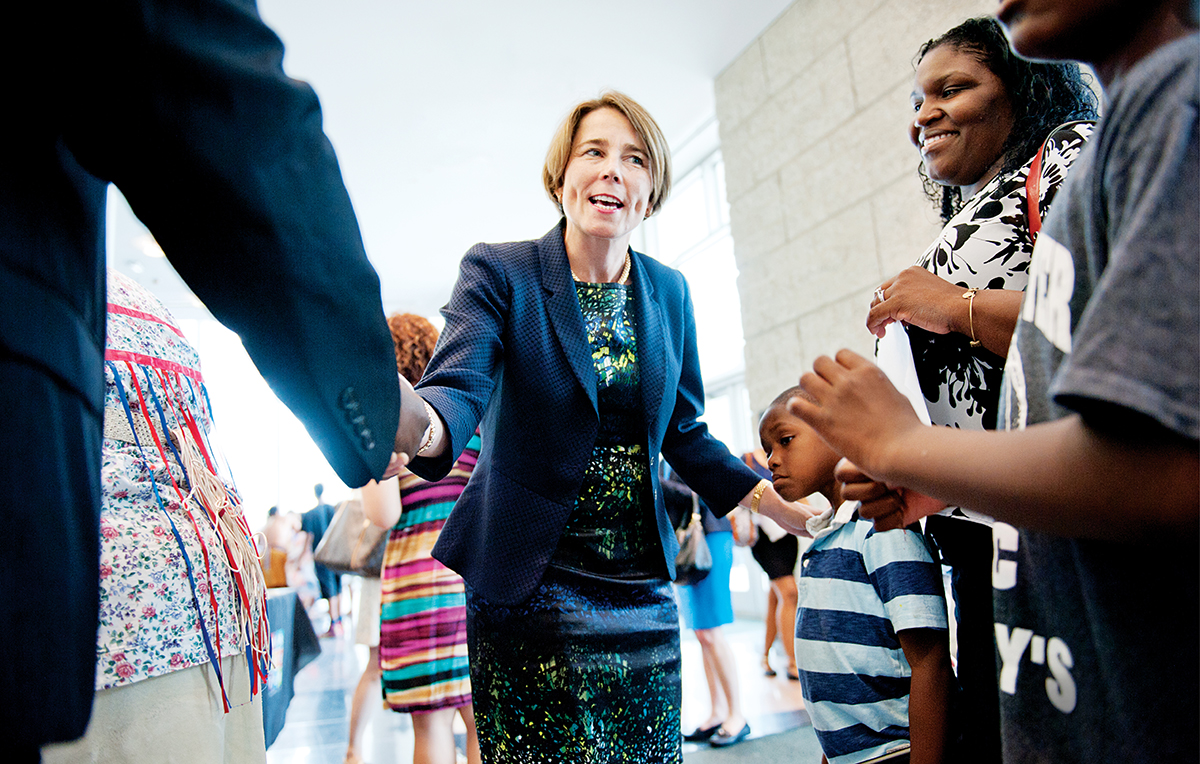The Unstoppable Maura Healey

For the most part, Maura Healey says, voters were far more intrigued by the fact that she’d been a professional basketball player than that she was gay. / Photograph by Webb Chappell
At 8 a.m. on a foggy day in May, hundreds of well-heeled members of the Greater Boston Chamber of Commerce gathered at the InterContinental Boston to find out whether Massachusetts’ new attorney general, Maura Healey, was a friend or a foe. They were mostly white men and women in crisp suits and polished shoes, and among them were Jim Rooney, the outgoing executive director of the Massachusetts Convention Center and soon-to-be Chamber CEO; Bob Gallery, Massachusetts president of Bank of America; and Cathleen Finn, a regional manager at IBM and a longtime gay activist. A few African Americans, including Sylvia Ferrell-Jones, president and CEO of the YWCA Boston, were there as well, along with tables of health insurers and healthcare executives.
Healey—the first openly gay attorney general in the country—had positioned herself as a champion of the underserved. She’d campaigned on promises to help low-wage workers who couldn’t afford to take unpaid time off to care for their sick dependents, and students stuck with crushing federal loan debts for worthless degrees from for-profit schools. She’d promised to use the office to protect people from unfair wages and housing scams, jacked-up healthcare and energy costs, and the opiate crisis that is ravaging the state. Although she was a political unknown when she began her campaign only 11 months before the Democratic primary, she shocked observers by trouncing Warren Tolman, a longtime progressive Democratic insider, by nearly two to one, and then the Republican candidate by the same margin.
When she won the attorney general’s race, Healey became one of the most powerful people in the state, thanks to the broad powers Massachusetts grants the office. Her predecessors include Scott Harshbarger (1991 to 1999), one of the first attorneys general to represent a state against tobacco companies; Tom Reilly (1999 to 2007), who investigated the Catholic Church after local media outlets uncovered the pedophile-priest scandal; and Martha Coakley (2007 to 2015), who waged a historic, successful lawsuit against the federal Defense of Marriage Act.
Though Boston’s Chamber of Commerce is more socially progressive than most, its members had reason to be concerned about this new power player. Less than a week into her term, Healey whacked one of the state’s largest employers when she killed the all-but-done Partners HealthCare deal, which involved the $11 billion healthcare giant taking over three of Greater Boston’s biggest suburban hospitals. (The move was especially surprising given that Coakley, her predecessor and mentor, had approved the deal before leaving office.) She’d also threatened to investigate Eversource—whose CEO, Tom May, received a $9 million compensation package in 2014—to make “sure that any excessive compensation isn’t being passed on to ratepayers as part of any proposed rate hike.”
Of more immediate concern to the attendees that May morning was that Healey had promised to implement earned sick days for workers by July 1, as required by a voter referendum. But keeping that deadline left little time for employers to comply with the mandate. Could she balance her fiercely progressive agenda with business interests? How, exactly, would the new sheriff get things done?
Healey has always been competitive—but friends and colleagues say she’s a team player. The oldest of five siblings, all born within nine years, she came from a close-knit Irish-Catholic family. Her grandfathers had worked at the Gloucester fishing docks, the post office, and the GE factory on the North Shore. Her parents held government jobs. Healey was raised on a 40-acre former farm in Hampton Falls, New Hampshire, in a farmhouse built in 1753. Everyone “pitched in, from the time we were babies,” she says. They collected eggs every morning, and all had paying jobs by age 14.
When Healey was 10, her parents separated, and they later divorced. Her mother, a school nurse, married the coach of the local high school’s soccer and basketball teams. Sports were important to the family, and Healey would run her siblings through intense drills, hitting grounders and fly balls until they could catch to her satisfaction. “It’s amazing they even talk to me now,” she says dryly, “given how bossy I was.”
Healey remembers her mother as being an active member of the community, always helping someone through some difficulty, “taking them a meal or doing their laundry.” The community returned the favor, too: When Healey had the chance to go to Olympic basketball training camp at 16 and again at 20, she says, the town chipped in to send her and her mother. By the time she finished her career at Winnacunnet High, Healey had broken all of its girls’ basketball records, despite being only 5-foot-4.
At Harvard, where she majored in government, Healey played point guard as co-captain of the women’s basketball team, and went on to play pro basketball in Europe for two years. (That stint later became a political asset: Her first campaign ad featured her spinning and shooting a basketball and saying, “The big guys have plenty of lawyers; the attorney general’s job is to fight for the rest of us.”) Liz Resnick, her college teammate and roommate, now the director of studies at Harvard-Westlake School in Los Angeles, says that while Healey was herself a “terrific” athlete, she always focused more on what everyone could achieve together than what she could do alone.

